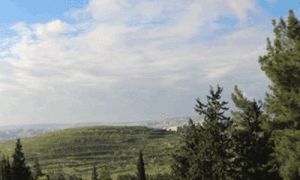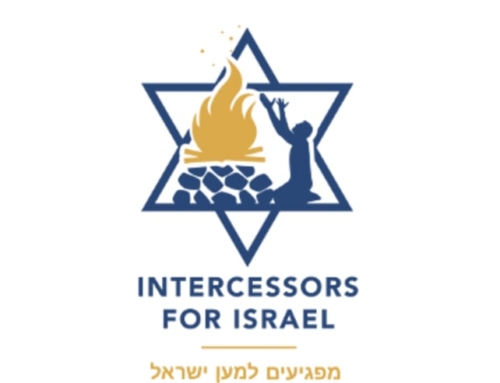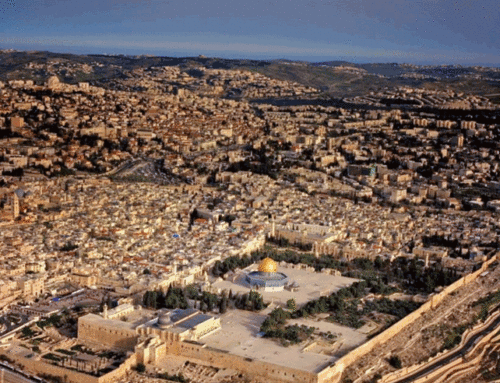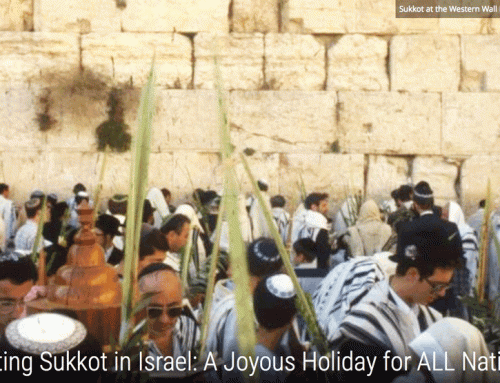“And you, O Bethlehem, in the land of Judah,
are by no means least among the rulers of Judah;
For from you shall come a ruler
who will shepherd my people Israel.”
Matthew 2:6 (Paraphrasing Micah 5:2)
The street sign reads Derekh Beit Lehem—literally, “Way of the House of Bread”. It was to this house of bread—Bethlehem—that during the time of the Judges Ruth had come with Naomi, even as the grain was in harvest. From her had come a son Obed, whose grandson was David the King.
A thousand years later, it was here, in the House of Bread, this “City of David”, that “the true bread given by the Father which comes down out of heaven, and gives life to the world…living bread, that one may eat of it and not die—“Bread of Life” came into our world (John 6:32-33, 48, 50). Born to a Jewish virgin named Miriam (English: Mary), he was laid in a manger.
“And there were shepherds abiding in the field, keeping watch over their flocks…”
The first to visit this “ruler who would shepherd his people Israel” were shepherds watching over their flocks on a nearby hillside. He would be called Yeshua—“Yehovah is Salvation”—because He would save His people from their sin (Matt. 1:21).
We pray a blessings of joy and shalom over our many readers in the Nations who this week are celebrating the birth of Yeshua—Jesus, the Bread of Life in Bethlehem–whose coming forth into our world in that tiny hamlet brought nourishment and life from the Father for all! We are so grateful for your voices joining with the angels (and your brothers and sisters here!) in proclaiming to the returned House of Jacob…and to all the world
A Saviour, which is Messiah the LORD
“O COME, LET US ADORE HIM!”
THIS WEEK’S TORAH PORTION:
From ancient times there has been a weekly portion (Parashah) from the first five books of Moses (The Torah) and an ending (Haftarah) from the Prophets read on the Sabbath in synagogues around the world. This portion is given a Hebrew name drawn from the opening words of the Torah passage. An illustration of this practice appears to have been recorded in Luke 4:16 where Yeshua (Jesus) arrived in the synagogue in Nazareth and was asked to read the portion (Isaiah 61) from the Prophets. We have found that in perusing these weekly readings, not only are we provided opportunity to identify in the context of God’s Word with millions of Jewish people around the world, but very often the Holy Spirit will illumine specific passages pertinent that week in our intercession for the Land and people of Israel. All texts are those of English translations of the Scriptures.
The readings for this week 21-27 December 2014 are called VaYiggash—“And He [Judah] Drew Near”:
TORAH: Genesis 44:18—47:27
HAFTARAH Ezekiel 37:15-28
*Genesis 44:18; 46:28. “Then he [Judah] drew near to him [Joseph]…” There is no question that the story of Joseph and his brothers provides a prophetic picture of Yeshua/Jesus and His “own” (i.e. the Hebrew people) who rejected Him—but to whom He will one day be revealed as “risen from the dead” to provide salvation. In a special way He continues to love them with an everlasting love and to “draw” them with loving kindness (Jeremiah 31:3). In His grace, many are already “drawing near” to God, confessing their sin and inadequacy as did the brothers (At the close of last week’s Portion Judah confessed: “How can we make ourselves righteous…God has brought out the iniquity of your servants!”). As they do so, Yeshua, like Joseph, miraculously reveals Himself to them! (Zechariah 2:9, 11).
PLEASE PRAY: for more and more in Israel to be led in God’s kindness to repentance and to respond to His call to “draw near.”
*Genesis 44:20, 30-34. “ ‘We have a father, an old man, and a child of his old age, who is young; his brother is dead, and he alone is left of his mother’s children, and his father loves him.’… ‘Now, therefore, when I come to your servant my father, and the lad is not with us, since his life is bound up in the lad’s life, it will happen, when he sees that the lad is not with us, that he will die. So your servants will bring down the gray hair of your servant our father with sorrow to the grave.’” Twenty-two years earlier, the jealousy and hatred in their hearts towards Joseph had calloused the hearts of the brothers towards their father’s feelings to the extent that they greatly dishonoured Jacob when they abused the son he loved, and brought back a false report of his death. “It is the Lord’s mercies which lead us to repentance.” We now see a genuine respectful and familial tenderness has at last been reawakened towards the feelings of their Father. Malachi 4:5-6 tells of a day when God’s prophetic word will turn the hearts of fathers to their children and the hearts of the children to their fathers, before the coming of the “great and dreadful day of the LORD.”
*Genesis 46:28. “Then he (Jacob) sent Judah before him to Joseph, to point out before him the way to Goshen. And they came to the land of Goshen.” Beginning in Chapter 43 and more strongly emphasized here, the mantle of leadership shifts from Reuben to Judah. From here on, a special precedence will be given to this tribe—“Judah goes first”! From Jacob’s blessing regarding a scepter of royalty (Gen. 49:8); to leadership of the armies marching towards Canaan (Numbers 10:14); to the securing of the land in the time of the Judges (Judges 1:2), to the Kingship of David; to the birth of the Messiah in the City of David; to Zechariah’s prophecy of the Last Days when “The LORD will take possession of Judah as His inheritance in the Holy Land, and will again choose Jerusalem” but “will save the tents of Judah first, so that the glory of the house of David and the glory of the inhabitants of Jerusalem shall not become greater than that of Judah” (Zechariah 2:12; 12:7)—God has chosen that this tribe shall lead (See also I Chronicles 5:2).
There is much of significance which may be drawn from this…but perhaps the most immediate point would be related to the name itself, Yehudah (Judah), given by Leah at his birth (Genesis 29:35). The word means “Thankful praise expressed by the raising of the hands”.
PLEASE PRAY: for a fresh awakening of thanksgiving and praise amongst the Body in Israel, with an awareness that this must come first (II Chron. 20:21-22). It is such thankful praise which will lead Israel into victories and into the true place of her inheritance in Messiah. Pray that the Lord will indeed “take possession of praise” in the Holy Land (Zechariah 2:12)—that it will be released to His glory in Spirit and in Truth. Only this past week a concert was held in the center of Jerusalem made up of wonderful new Hebrew songs of praise and worship written by those living here. Those new songs and many more are now available in printed form and recording for use by the Body in the Land!
*Ezekiel 37:21-23. “Surely I will take the children of Israel from among the nations, wherever they have gone, and will gather them from every side and bring them into their own land; and I will make them one nation in the land, on the mountains of Israel; and one king shall be king over them all; they shall no longer be two nations, nor shall they ever be divided into two kingdoms again. They shall not defile themselves anymore with their idols, nor with their detestable things, nor with any of their transgressions; but I will deliver them from all their dwelling places in which they have sinned, and will purify them. Then they shall be My people, and I will be their God.”
PLEASE PRAY: that the Spirit who ‘convicts of sin and righteousness and judgment’ would be poured out on Israel in increasing measure, bringing her to a place where God can reveal the Purification which has been prepared for her—so that Israel may indeed dwell in his land of covenant forever (vs. 25).
*Ezekiel 37:21-22. “I will…bring them into their own land; and I will make them one nation in the land, on the mountains of Israel; and one king shall be king over them all; they shall no longer be two nations, nor shall they ever be divided into two kingdoms again” (Emphases ours).
It is plain that God still sees the Land promised to Abraham, Isaac and Jacob’s seed forever as still being “their own land.” The “mountains of Israel” refers to that same area currently labelled the “West Bank” and slated by much of the world to be split off to form “two nations side by side” each with its own leader. From these two verses, we see that such a “two–state” solution made up of two nations and with two different leaders is not nor will ever be God’s plan. Only He can bring divided Israel back and make them one nation in this same section of His land in which the promises in Shechem, Bethel and Hebron were made. Hence, the huge warfare already raging and which will continue until Israel comes into relation with her God, the final battle is won, and God’s Kingdom is established there (Ezekiel 38-39).
PLEASE PRAY: That God’s kingdom come in the returning Children of Israel and in the Mountains of Israel—Judea, Jerusalem and Samaria. Pray for a renewed sense of stewardship of Jews in Israel regarding all which God says is “their own land”—and an awareness of Who must be trusted to bring it to pass if it is never to be divided into two kingdoms again.
*Ezekiel 37:24-25. “David My servant shall be king over them, and they shall all have one shepherd…My servant David shall be their prince forever.” Evangelical Christianity often sees this “David” as Yeshua/Jesus, the spiritual and physical descendant of the David anointed by Samuel. Yeshua will certainly reign (Psalm 2) from His throne in Jerusalem as King of Kings; as verse 28 here states, “the nations also will know that I, YHVH, make Israel holy, when my holy place is in their midst forevermore.” However, in Hebrew tradition (and among many Messianic believers in the land), it is assumed that this passage refers indeed to a resurrected David, the “shepherd king” son of Jesse (It is of interest that the “Prince” who begins to be mentioned in Ezekiel 45:7 and who ministers in the midst of the mysterious Temple described there is designated with the same Hebrew word nasi as the word for “prince” here. David’s often stated desire had been that he might “dwell in the house of the YHVH forever.”).
PLEASE PRAY: That God’s government come into place in this land. Both in the near and in the distant future, may His Kingdom Come!
Martin & Norma Sarvis
Jerusalem
[The Torah and Haftarah portions for next week (28 December 2014—3 January 2015: VayYechi—“And He [Jacob] Lived”) will be: TORAH: Genesis 47:28; HAFTARAH: I Kings 2:1-12]







Shalom.
I am very grateful to God Almighty for your life, family and the ministry.
I am blessed with all your “Israel Prayer Update”. I want to be parth of the prayer ministry if you can include me in your mailing list.
I will be very grateful if I can start receiving this prayers update now.
May the good Lord keep and bless your life, family and the ministry.
Shalom.